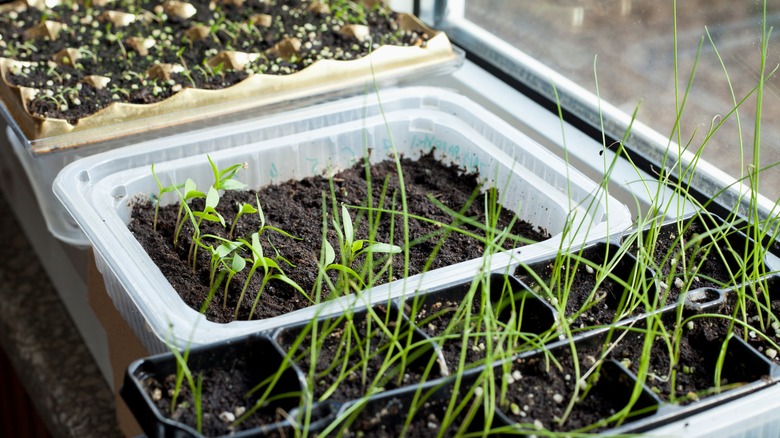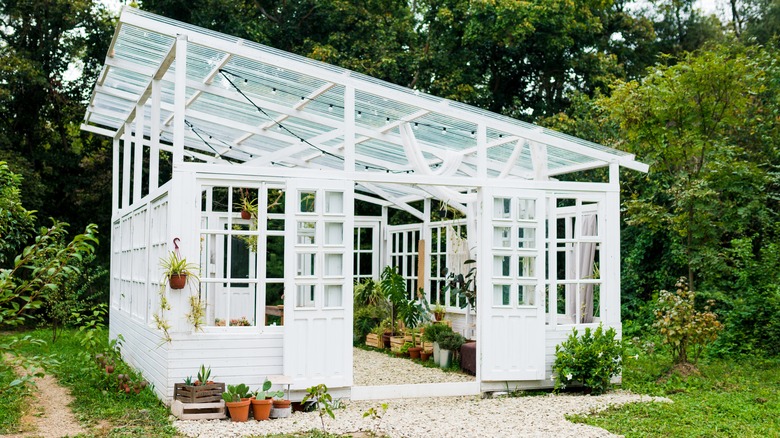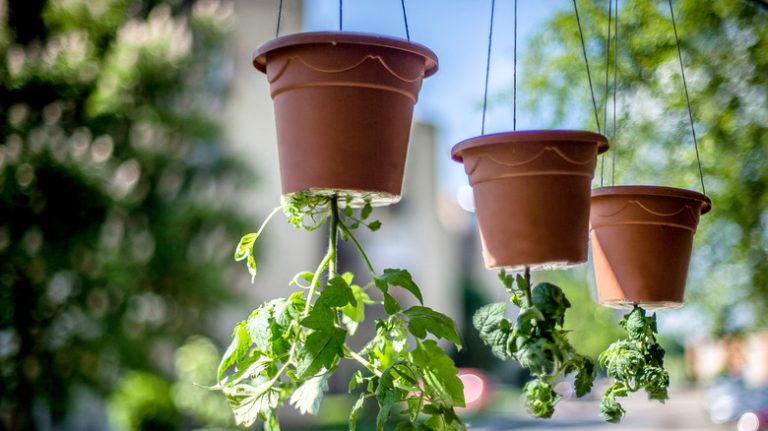Do you or someone you know have windows left over from a recent home upgrade? As more and more homeowners change out older, drafty windows for the newest energy-saving versions, stacks of discarded materials can pile up. These perfectly-usable panes need not end up in the landfill. Old windows can take on a second life as part of a DIY greenhouse. See a project morph satisfyingly from a heap of scraps into a beautiful and functional gardening space on @lovechloejane’s TikTok. To complete this project, she cleans and paints the windows, builds and paints the wooden frame, attaches the roof and windows, covers the floor, and fills the space inside with furniture and plants.
While not exactly a project you can whip up in a weekend, following a few steps can help you cobble together your own structure. You don’t have to be an expert builder to pull off a greenhouse like @lovechloejane’s, but at the same time, crafting a greenhouse from salvaged materials probably won’t come without challenges. Patience, trial and error, and a sense of humor are just as necessary as a hammer and nails for this project. However, the end results are well worth the effort! You can also get inspired by other greenhouse ideas that will transform your backyard.
How to build your own greenhouse
it’s finished!! my favourite part of our cottage home. can’t wait to grow things here 🌱🌸 #greenhouse #cottagegreenhouse #diygreenhouse #greenhousebuild #glasshouse #reclaimedwood #reclaimedwindow #sustainablehacks #renovation #cottagelife #mindfulliving #diy #gardentok #diggersclub #southaustralia #farmlife
♬ Wes Anderson-esque Cute Acoustic #3(973702) – Kenji Ueda
Watch on TikTok
The costs of building a greenhouse from scratch, even one with repurposed materials, can add up. If you don’t already have a collection of windows on hand, check online community platforms. For a low price, you can round up supplies from Facebook Marketplace, Craigslist, or other outlets.
The structure’s framing depends entirely on the shape of and quantity of your windows. Start by laying out your windows on the ground to see how they’ll fit together as part of a wall. Once you’ve laid out four walls, take careful measurements. This will determine the final dimensions of the greenhouse and the amount of lumber you’ll need. Frame the whole space with solid posts — 4x4s or 6x6s will work. Then, use 2x4s or 2x6s around your windows. Fit your roofing and paint the framing before you begin installing the windows. If your windows need painting, @lovechloejane suggests doing that before you install them as well.
A combination of brackets, trim, and liquid nails can hold in your windows. If your area gets high winds, make sure to add extra bracing to the windows that will take the most impact. Consider placing two windows that open on opposite ends of the build to help circulate air and control the temperature. Install the door, and you’re ready to outfit the interior. Shelving and hanging baskets make the most of vertical space and rising heat, while leftover wood pieces can come together as handy raised beds.
Go for extra green points

Repurposing old or unwanted items for your project besides just the old windows is an ideal way to keep more waste out of the landfill. Is there a jumble of 2x4s cluttering your yard? Your DIY greenhouse is the perfect way to use up those leftovers. Do you know someone who’s replacing their deck? Scour the demo pile! Support posts, 2x4s, and even hardware can find their way into your design. Seek out a salvaged door, turn wood scraps into shelves, and browse thrift stores for pre-owned pots.
You can also start spring seedlings in cardboard egg cartons, clamshell plastic packaging, or soup cans. Peruse the forgotten paint supply in your garage for a free way to protect and decorate your structure. Lay out wood pallets as flooring or use old rocks or gravel to cover the floor. You can also keep the space warmer at night with DIY heat sinks. Paint reused plastic jugs a dark color and fill them with water for an efficient way to trap heat that builds up in the space during the day. During cool nights, the heat sinks give off warmth to keep your plants comfortable until sunrise. By using all of these repurposed items, you’ll save money and the planet while also achieving the greenhouse of your dreams.




